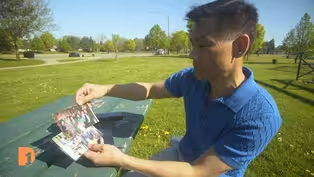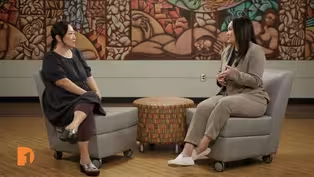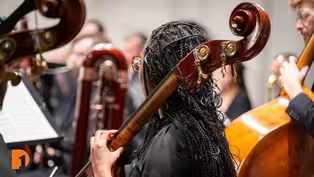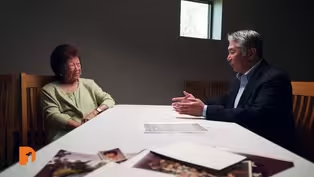
Interactive exhibition threads together Vietnamese American stories 50 years after Fall of Saigon
Clip: Season 9 Episode 46 | 3m 30sVideo has Closed Captions
Artist Linh My Truong talks about her exhibit “Threads of Passage: From Vietnam to America.”
To commemorate the 50th anniversary of the end of the Vietnam War, Vietnamese American artist Linh My Truong presents “Threads of Passage: From Vietnam to America,” an interactive exhibit that features the stories of Vietnamese refugees who fled to America after the Fall of Saigon. One Detroit contributor Chien-An Yuan talks with Truong about her exhibit and the intergenerational stories it tells.
Problems playing video? | Closed Captioning Feedback
Problems playing video? | Closed Captioning Feedback
One Detroit is a local public television program presented by Detroit PBS

Interactive exhibition threads together Vietnamese American stories 50 years after Fall of Saigon
Clip: Season 9 Episode 46 | 3m 30sVideo has Closed Captions
To commemorate the 50th anniversary of the end of the Vietnam War, Vietnamese American artist Linh My Truong presents “Threads of Passage: From Vietnam to America,” an interactive exhibit that features the stories of Vietnamese refugees who fled to America after the Fall of Saigon. One Detroit contributor Chien-An Yuan talks with Truong about her exhibit and the intergenerational stories it tells.
Problems playing video? | Closed Captioning Feedback
How to Watch One Detroit
One Detroit is available to stream on pbs.org and the free PBS App, available on iPhone, Apple TV, Android TV, Android smartphones, Amazon Fire TV, Amazon Fire Tablet, Roku, Samsung Smart TV, and Vizio.
Providing Support for PBS.org
Learn Moreabout PBS online sponsorship- [Linh] My name is Linh My Truong, and I'm a visual artist based in Detroit.
Love to collage together different types of videos and images to create narratives.
But for this piece, the narrative is my family's story.
So that was really important for me to treat that with respect and to represent that properly.
And it's the first artwork I've done at all about my heritage.
(person speaking indistinctly) - [Linh] When I started this project, I really wanted to get stories from refugees themselves, because that generation is dying out and they're my parents' generation.
But I was surprised at how many younger Vietnamese were embracing this idea of gathering oral histories.
So I really opened it up to like, if even if you didn't experience the journey yourself, this is a great opportunity to ask your elder, to ask your grandparents, your parents about their experience, or even just talk about how their voyage, their refugee experience impacted your life and your identity in America.
The open call really was very wide reaching in terms of the stories and different generations.
So I'm really pleased about that.
My background is in textiles.
I love the slow, meditative art form of weaving, embroidery, sewing.
About six years ago, I started incorporating electronics because I feel like there's a lot of opportunity to combine textiles with electronics for interaction.
Whenever I go to a gallery and I look at a textile exhibition, I just wanna touch everything.
That's just the nature of textiles.
So it's really frustrating for me when you can't.
So I'm trying to disrupt that idea you have in a gallery that you can't touch the art, and actually invite the viewer to interact with the piece.
But I find that, you know, the engagement really goes up if you allow people to interact with the work.
And in a sense, the viewer, the participant becomes part of the art itself.
- My mother's thread starts in Bac Lieu.
Rural southwest.
- They have a table here at my exhibition that's all Vietnamese American authors.
I wanted to include all of the cultural aspects in with this exhibition to give people a wider view of the amazing voices from the Vietnamese community.
- Just meeting you.
I wish my family was here.
- I've noticed a lot of my friends who are American and they are like fifth, sixth generation in, they know nothing about their heritage.
They're so far removed from it.
And I think that fact that I'm second generation, I was born in America, my parents came over and they had such a harrowing journey.
And my mom, she grew up in a village.
She was born in a village in the north where her ancestors had been for generations.
She doesn't know, you know, when they moved there.
It was just so many generations.
And then within her generation, she moved twice.
She moved from the north to the south and then left Vietnam for America.
So that's a pretty abrupt change from your lineage.
And I wanted to be the generation to record that.
So I wanted to capitalize on this moment 50 years after the war, so that it would last for future generations.
Video has Closed Captions
Clip: S9 Ep46 | 3m 29s | Vietnamese Americans living in metro Detroit reflect on the Fall of Saigon 50 years later. (3m 29s)
AAPI Story Series | Brenda Hu and Meaghan Kozar: Am I American Enough?
Video has Closed Captions
Clip: S9 Ep46 | 5m 51s | Two women talk about their Asian American identities and what it means to be “American” enough. (5m 51s)
One Detroit Weekend | Things to do around Detroit this weekend: May 16, 2025
Video has Closed Captions
Clip: S9 Ep46 | 1m 37s | A spring market, a collectibles fair, a comedy challenge and more events happening this weekend. (1m 37s)
Video has Closed Captions
Clip: S9 Ep46 | 6m 40s | Mary Kamidoi and Shinji Takahashi talk about the Japanese incarceration camps during World War II. (6m 40s)
Providing Support for PBS.org
Learn Moreabout PBS online sponsorshipSupport for PBS provided by:
One Detroit is a local public television program presented by Detroit PBS















